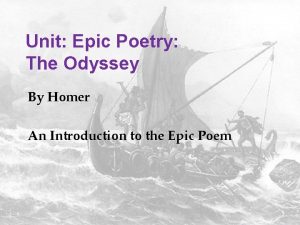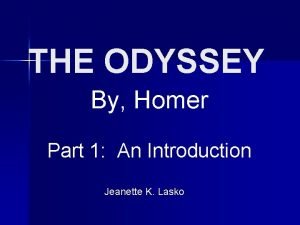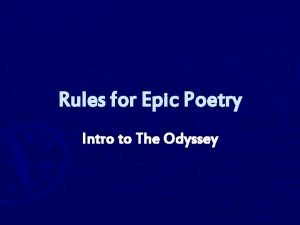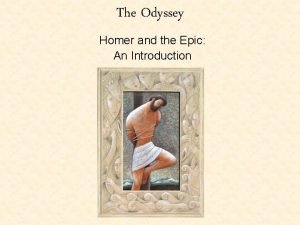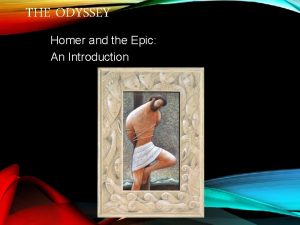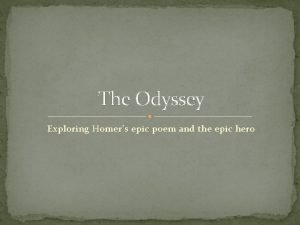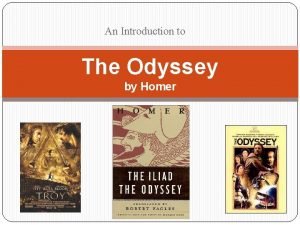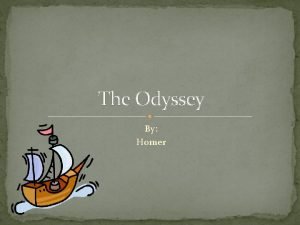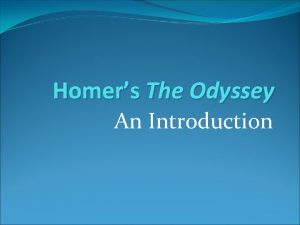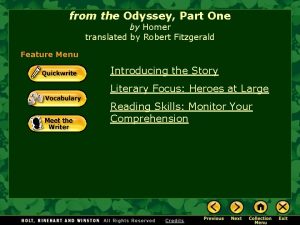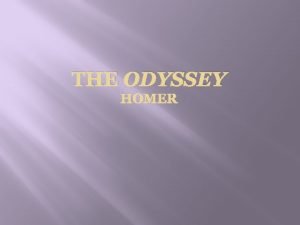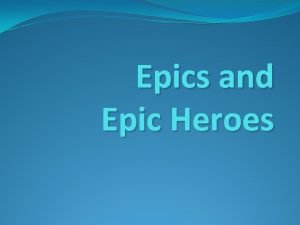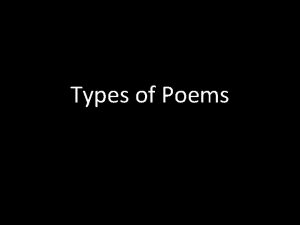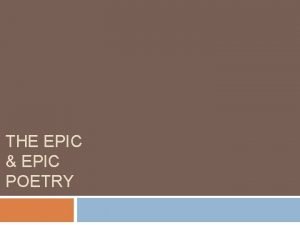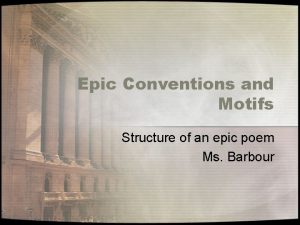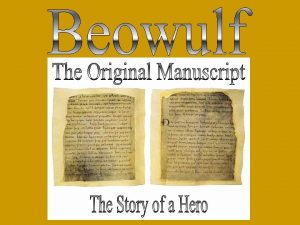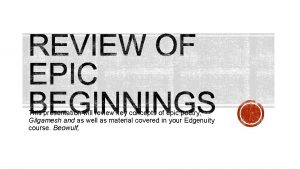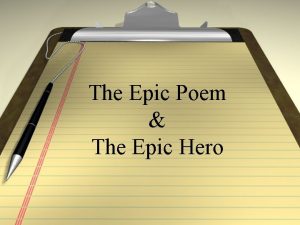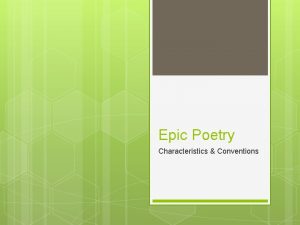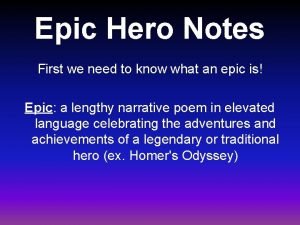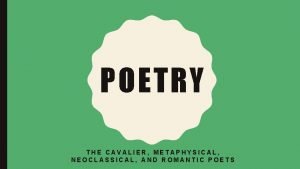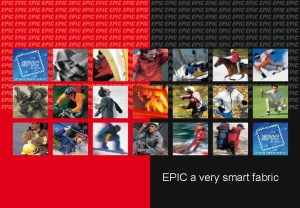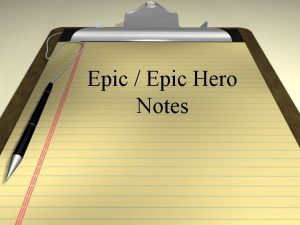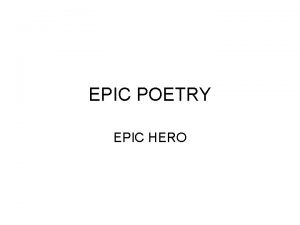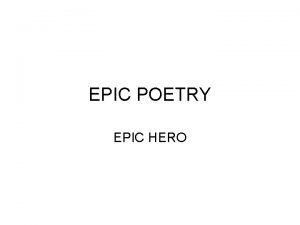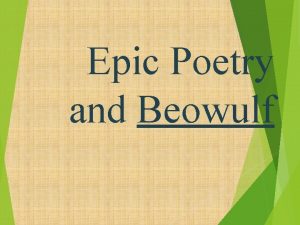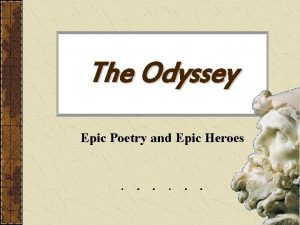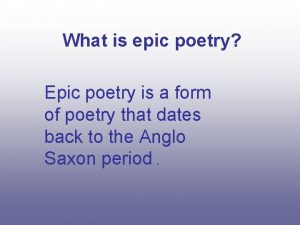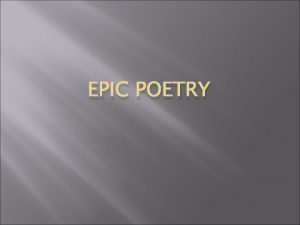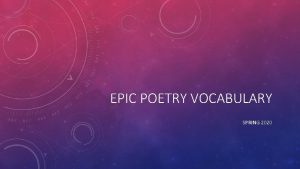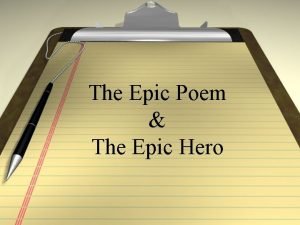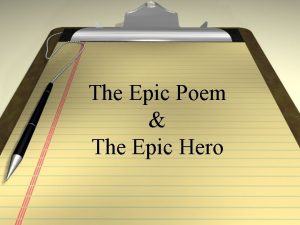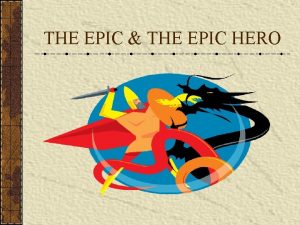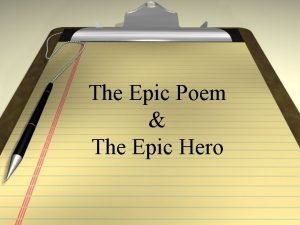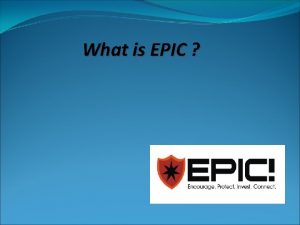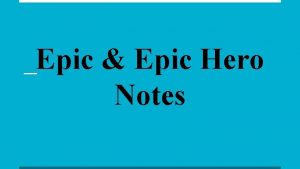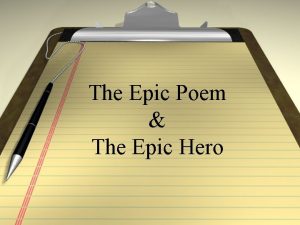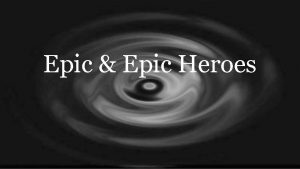INTRODUCTION to EPIC POETRY What is Epic Poetry




















- Slides: 20

INTRODUCTION to EPIC POETRY

What is Epic Poetry? W Long narrative poem W Written in an elevated style W Celebrates the deed of a legendary hero or god

Literary Devices W Alliteration– repetition of similar sounds especially initial consonant or stressed syllable (eg. “Shild’s strong son” [23, line 19]) W Metaphor- comparison between two similar things W Simile- Comparison using “like” or “as”

Literary Devices Cont. W Epithet- brief phrase characterizes a person place or thing (eg. “the Lord of all Life”, “the Rule of glory, ” “the Lord of heaven and earth”) W Kenning- two-word metaphorical name for something (eg. “sea-road” for ocean [30, line 239])

Literary Elements W Internal Conflict- Struggle that takes place within the mind of a character who is torn between opposing feelings and desires W External Conflict- When a character struggles against some outside force… Person, nature, society, or fate.

Early Literary Influences & Historical Events

Epic of Gilgamesh 2500 BC W 11 Clay Tablets (story) 12 th Tells of his ruling the netherworld W Most important epic poem in human history W Various adventures of hero-king searching for immortality W An account of the flood W Characters Gilgamesh (2/3 god & 1/3 human) Enkidu (wild man)

Summary of Gilgamesh W Meets Enkidu (BFF) W 1 st trip to Land of Cedaes to kill Humbaba W Later slays the Bull of Heaven Angers gods=suffering W Seeks Utnapishtim & finds heartache W Returns to Uruk and writes his story

Bible 4000 BC- 77 AD W Judeo-Christian “God” W Contains the Old & New Testaments W Missionaries & Crusades W Holy Grail W Referenced in a lot of literature

Homer 800 BC W Did he exist? W Creator of the Epic Poems The Iliad and The Odyssey W Most likely a minstrel Traveling singer/storyteller W Poems were oral for centuries before written down

The Trojan War 1184 BC/ 800 BC (written) W Main topic of The Iliad by Homer W W W and latter The Aeneid by Virgil Achaeans vs. Trojans (10 yrs. ) Helen of Troy abducted by Paris Achilles withdraws from the war and then rejoins in 10 th yr. & kills Hector the Trojan Prince Wooden horse City captured & Helen returned to Menelaus

The Odyssey 800 BC W Tale of Odysseus W 10 yrs. in Trojan War W 10 yrs. to get home W Presumed dead wife Penelope fighting off suitors W Consists of 24 books

Naturalis Historia, 1 st Encyclopedia 77 AD W Written by Gaius Plinius Cecilius Secundus (a. k. a. Pliny the Elder) W 37 Book 1 st has preface & tables of contents List of authorities W Published 1 st 10 himself W Very little revision if any

The Adventures of Beowulf 650 AD W 1 st Epic Poem written in English, Old English W Author Unknown W Adventure of a great Scandinavian warrior W 1 manuscript survived the monastery destruction by Henry VIII

Historic Background W Geats & Danes W Accurately reflects the time period (6 th century) W Angles, Saxons, & Jutes W Germanic Code Comitatus (group) -of loyalty • Sworn loyalty to king = gifts Feudal System

Historic Background Cont. W Women were thought of as holy Belief in fate W Biblical references relate to Old Testament W Author most likely Christian W Scops- composers & storytellers

Geneology of Geats, Danes, and Swedes

Main Characters W Beowulf W Dragon W Grendel & Mother W Higlac W Hrothgar W Shild W Unferth W Welthow W Wiglaf

Time and Place W Set in Denmark and Geatland W 6 th Century W Herot- mead hall

Why is Epic Poetry Important today? W Stories are still being passed down from generation to generation. W We see these same plots, heroes, struggles, archetypes, and events happening in life today. W References to these epic poems are in our books and movies today.
 The odyssey and epic poetry: an introduction, part 1
The odyssey and epic poetry: an introduction, part 1 The odyssey and epic poetry an introduction part 1
The odyssey and epic poetry an introduction part 1 The odyssey and epic poetry: an introduction, part 1
The odyssey and epic poetry: an introduction, part 1 The odyssey and epic poetry an introduction part 1
The odyssey and epic poetry an introduction part 1 The odyssey
The odyssey Homers epic poem
Homers epic poem An introduction to the odyssey
An introduction to the odyssey The odyssey and epic poetry an introduction part 1
The odyssey and epic poetry an introduction part 1 The odyssey and epic poetry an introduction part 1
The odyssey and epic poetry an introduction part 1 The odyssey and epic poetry an introduction part 1
The odyssey and epic poetry an introduction part 1 Homer's first epic is the primary model for the epic of
Homer's first epic is the primary model for the epic of What makes an epic hero
What makes an epic hero Example blank verse
Example blank verse What is an epic
What is an epic What characteristic is not true of epics
What characteristic is not true of epics Beowulf interesting facts
Beowulf interesting facts Epic poem
Epic poem Definition of epic poem
Definition of epic poem Conventions of epic poetry
Conventions of epic poetry What is epic poetry
What is epic poetry Neoclassical poetry vs romantic poetry
Neoclassical poetry vs romantic poetry
